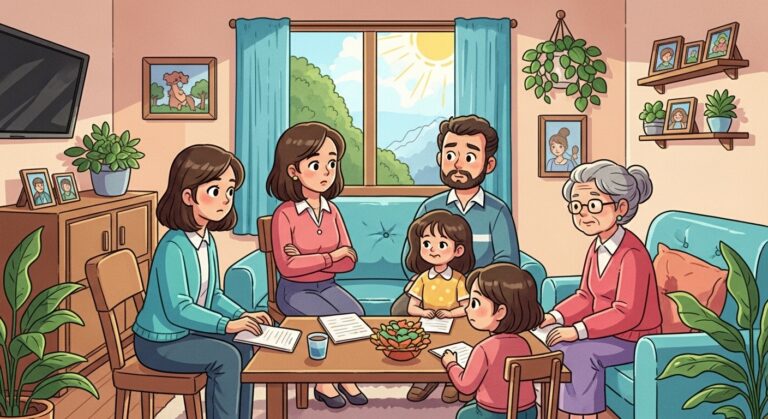In a quaint suburban neighborhood, filled with the laughter of children and the comforting smell of home-cooked meals, a family was navigating the intricate web of relationships that often accompanies familial obligations. Olivia, a dedicated wife and mother, found herself at the center of a dilemma that was testing her patience and her marriage.
Olivia and her husband, Mark, had always been a team. They prided themselves on their ability to tackle life’s challenges together. However, last year had thrown them a curveball: Mark’s mother, Carol, was going through a painful separation from her husband of over twenty years. The split left Carol feeling vulnerable and lost, prompting Olivia and Mark to rally around her, offering support in any way they could.
At first, it was manageable. They helped Carol settle her debts, which were shockingly high despite her ex-husband covering the household expenses. They found her a new apartment, assisted her with financial planning, and even took on the burden of adding her to their phone bill. But as time passed, the weight of Carol’s reliance on them began to strain their own relationship.
Olivia could sense the tension building, especially in Mark. He felt torn between his loyalty to his mother and his commitment to Olivia and their daughter, Lily. The family dynamics became increasingly complicated when Carol, despite her financial troubles, made a series of questionable choices. She had recently leased a brand-new electric car, a luxury item that seemed out of place given her financial situation. Olivia couldn’t fathom how Carol could justify such an expense when she was already drowning in debt.
Then came the incident that pushed Olivia to her breaking point. It was Easter, a time for family gatherings and joyous celebrations. Olivia and Mark had decided to spend the holiday at Olivia’s parents’ house, where they had planned to keep the festivities simple and sugar-free for Lily. They were trying to instill healthy habits in their daughter, and that meant limiting sugary treats, especially around holidays.
Carol, however, had other plans. She was furious when she discovered that she wouldn’t be able to spoil Lily with chocolate eggs. “It’s the only happiness I have left!” she had exclaimed, her voice trembling with desperation. “You’re ruining my last joy! Can’t a grandmother do something nice for her granddaughter?”
Olivia stood her ground, reminding Carol that they were the parents and had the final say in how they raised their child. The argument escalated, with Carol accusing Olivia of being controlling and heartless. It was a painful confrontation that left Olivia feeling guilty but also resolute.
As the weeks rolled on, Carol’s behavior grew more erratic. She began dating someone significantly younger than Mark—someone just a few years older than Olivia. The news shocked the family. While Mark tried to be supportive, Olivia found it hard to swallow. She couldn’t help but feel that Carol was trying to reclaim her youth at the expense of her own responsibilities.
One evening, after a particularly tense dinner with Carol, Olivia sat down with Mark. “I love your mother, but I can’t keep supporting her if she continues down this path. It feels like she’s trying to live her life through us, and it’s suffocating. I want to help her, but I need to protect our family too.”
Mark sighed heavily, understanding the weight of Olivia’s words. “I know it’s been hard. I just wish she would see how her actions affect us. I’m caught in the middle, and I don’t want to choose sides.”
After a long discussion, they decided it was time to set boundaries. They would continue to support Carol, but only within reasonable limits. They scheduled a family meeting, inviting Carol to discuss her recent choices and how they were impacting everyone. It was a chance for them to express their concerns and for Carol to share her feelings.
When the day arrived, tensions were high. Carol walked in, her usual bravado replaced by uncertainty. Olivia and Mark took turns expressing their worries, emphasizing their love for her but also their need for her to take responsibility for her own life.
“Mom, we want you to be happy, but you can’t keep expecting us to solve your problems,” Mark said gently. “You need to start making choices that are sustainable and beneficial for you, not just for temporary happiness.”
Carol listened, her eyes glistening with unshed tears. It was a moment of vulnerability that none of them had anticipated. “I just feel so lost,” she admitted, her voice shaky. “I thought if I could find someone to fill the void, it would help.”
After several moments of silence, Olivia spoke up. “Finding joy in new relationships can be wonderful, but you have to do it for yourself, not to escape. We’re here for you, but you have to be willing to stand on your own two feet.”
The conversation opened a floodgate of emotions and realizations. Carol began to understand the impact of her actions on her family. She recognized that her happiness couldn’t be reliant on others, and that perhaps, this was the first step in her journey to reclaiming her identity.
In the weeks that followed, Carol took a step back from her relationship and began focusing on her own healing. She sought counseling and started to take control of her finances. Olivia and Mark felt the weight lift from their shoulders as Carol began to rebuild her life, this time with an understanding of the importance of self-sufficiency.
Through this journey, the family learned the delicate dance of love, boundaries, and the importance of supporting one another while still maintaining their own identities. They discovered that sometimes, the hardest conversations lead to the most profound transformations.
As spring blossomed into summer, the family embraced their new dynamics, sharing laughter and joy in a more balanced relationship. They had weathered the storm together, emerging stronger and more united than ever.





0 Comments